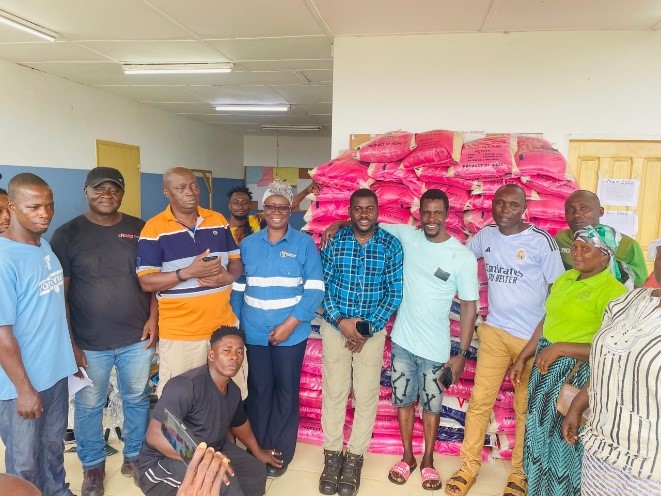The US Agency for International Development (USAID) has provided over US$200,000 grant funds to support livelihood and enterprise development activities for people living in communities at the fringes of the Marshall Wetlands. The Marshall Wetlands is a Proposed Protected Area (PPA) with an enormous potential for ecotourism, but faces immense threats from local communities who harvest the mangroves for fuel wood and charcoal production.
The USAID fund will economically empower local youth, women, marginalized people, and local farmers to grow fruits, vegetables and at the same time produce honey and coconut oil to supply the local markets, hotels, resorts and the Liberia Chimpanzee Rescue and Protection (LCRP) Sanctuary in the area.
The grant, which spans a five-year period, was awarded to the LCRP, but will be collaboratively implemented by Partners in Development (PADEV). PADEV will coordinate implementation activities with other local partners, including Liberia Pure Honey, the Forestry Training Institute (FTI) and Liberia Pure Coconut.
Guided by a social enterprise approach, structured community governance entities will be trained to manage community business funds and will coordinate with the local leadership to determine community development priorities to which portion of profits from the community enterprise will address.
To ensure sustainability and to improve the productive capacity of the local people in the area, PADEV, in coordination with other partners, will train beneficiaries of the project in small scale business development and orient women’s leaders and local entrepreneurs on how to facilitate microfinance initiatives through Village Saving and Loan Association (VSLA).
With technical support from the Forestry Training Institute, local communities will also receive training on how to set up and maintain woodlots. The woodlot aspect of the project is a medium- to long-term support to the communities intended to offset the harvesting of the mangroves, complement their source of fuel wood and production of charcoal.
Referred to as the Local Community Capacity Development Activity (LCCDA), the intervention seeks to improve the technical and financial capacity of the communities, reduce their dependence on the mangrove for livelihoods, and curtail the pervasive fishing practices in the surrounding rivers of the wetlands.
“The American Government and people are always prepared to be part of the economic development and the human resource capacity building of Liberians,” Karlin Hanna, Deputy Director at the Division of Economic Growth at USAID-Liberia, noted when he formally launched the project in Charlesville, Margibi County. Karlin called on residents of Charlesville to support the project, saying the LCCDA is also an opportunity to help protect the chimpanzees and, at the same time, develop their community.
The Local Community Capacity Development Activity project was inspired by James and Jenny Desmond, the founder and manager of Chimp Sanctuary in Charlesville. Speaking at the launch of the project, Dr. James Desmond underscored the values and benefits of the ecosystem of the Marshall Wetlands and expressed the hope that communities in the Marshall landscape will take advantage of the opportunity to become potential producers and suppliers of fresh fruits to the Sanctuary.
Dr. Desmond said, “Right now, we spend about US$6,000 monthly to buy fruits for the chimps. We travel as far as Bong and Gbarpolu to buy fresh fruits. In 12 months, we spend roughly US$72,000. It is better for us to buy the fruits from you here. That way, the money remains in the community.”
The launch event was attended by representatives of USAID Liberia, Forestry Development Authority (FDA), FTI, the local leadership of Charlesville and residents of towns and villages around the Wetlands.
The Marshall Wetlands is surrounded by 67-small communities in Margibi and Grand Bassa counties, with an estimated combined population of 85,632. This current intervention will reach at least 5,000 direct and indirect beneficiaries in 6-communities across the landscape.
Mark James Lloyd, Township Commissioner of Charlesville, offered to support the project, saying it will touch the lives of the people in the community and will help to ease the economic burden on his citizens.







